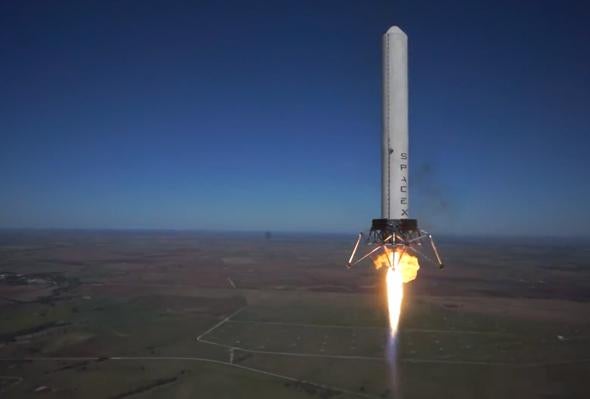Here’s how you will spend the next one minute and 37 seconds of your life: 1) Click the gear on the lower right of this video to make it hi-res, b) make it full screen, γ) turn up the volume, and ד) sit back and be amazed at this ridiculously awesome video of a SpaceX reusable Grasshopper test flight.
Grasshopper is a modified first stage Falcon 9 rocket, equipped with a single engine (instead of nine), landing legs, and other doodads to keep it upright, sense its location, and throttle the thrust. This makes it capable of launching, hovering, moving laterally (sideways), and landing…including, obviously, right smack dab on the same spot from whence its short journey began.
This flight, performed on Oct. 7, 2013, is the highest altitude yet for Grasshopper, reaching 744 meters (nearly a half mile). The idea is to test out the equipment and software, eventually allowing the reuse of Falcon 9 first stages after an orbital launch. You can read the details on how all this works in previous articles I’ve written (also with amazing video) here and here.
The video above was shot by a hexacopter, a small remote control drone utilizing an arrangement of six horizontal propeller blades for maneuverability. I love how the camera tilts up to get the Grasshopper into view, and you can see one of the hexacopter blades merrily spinning away. I was surprised how close it can get, but that may be an illusion: Grasshopper is ten stories tall, so it would look pretty big even from a decent distance away.
I’m very pleased with the progress and innovation being done by the private sector when it comes to rocketry (and I include Orbital Sciences Corporation along with SpaceX in this assessment). For decades, NASA has been a wonder in breaking new ground (so to speak) with space travel, and now it’s possible for a few people with large personal wealth to follow that path. Between NASA’s vast experience and reliability, and a corporation’s flexibility and drive for making access to space less expensive, I can hope for a very bright future for humanity in space.
…assuming Congress can fix the current mess it’s made, and then (along with the White House) decides to fund NASA at more than starvation levels, and NASA itself makes the right decisions about money as well.
That’s a lot of implied “ifs”. The Grasshopper made one small step today, but we also need to be mindful of our next giant leap.
